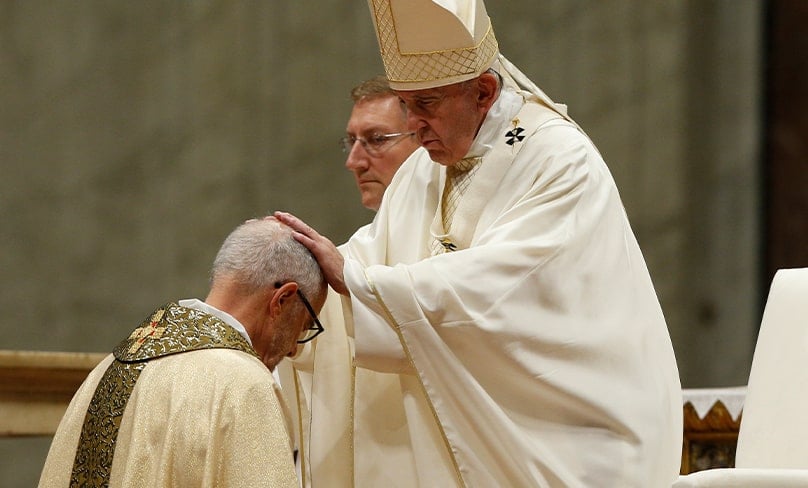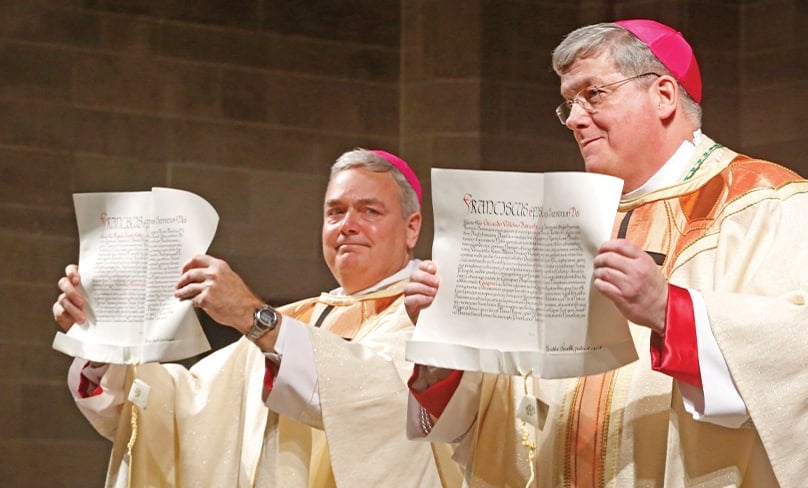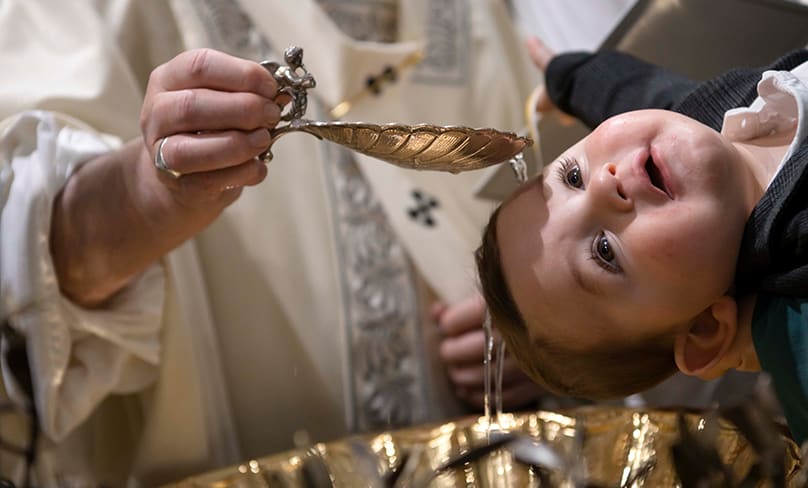
Laying of the Hands and the gifts of the Holy Spirit
Throughout both the Old and New Testaments, the laying on of hands is key to the passing on of authority and power, blessing and lineage.
At every ordination, the essential rite of the Sacrament of Holy Orders consists in the bishop’s imposition of hands on the head of the one being ordained and the specific consecratory prayer.
The laying of hands occurs in silence, and is followed by the prayer of consecration recited by the bishop conferring the sacrament “asking God for the outpouring of the Holy Spirit and his gifts proper to the ministry to which the candidate is being ordained.” (CCC, 1573)
These words and actions are essential to the Sacrament of Holy Orders and are key to the ontological change that takes place within the ordained man: he becomes configured to Jesus Christ as a priest through this sacrament.
This laying on of hands is not a mere symbol or bizarre gesture that just ‘happens’ to occur at the ordination of a deacon, priest or bishop without purpose.
“… the word ‘ordination’ … confers a gift of the Holy Spirit that permits the exercise of a ‘sacred power’ which can come only from Christ himself through his Church.”
As the Catechism defines: “…the word ‘ordination’ is reserved for the sacramental act which integrates a man into the order of bishops, presbyters, or deacons, and goes beyond a simple election, designation, delegation or institution by the community, for it confers a gift of the Holy Spirit that permits the exercise of a ‘sacred power’ which can come only from Christ himself through his Church.” (no. 1538)
Furthermore, “ordination is also called consecration, for it is a setting apart and an investiture by Christ himself for his Church. The laying on of hands by the bishop, with the consecratory prayer, constitutes the visible sign of this ordination.” (no. 1538)
The imposition of hands by the bishop upon the head of the man receiving ordination together with the consecratory prayer represents and is the means by which the power and grace of the Holy Spirit that the bishop received when he was ordained is also handed on to the one now receiving the sacrament.
The gifts of the Holy Spirit conferred through the Sacrament of Holy Orders “can come only from Christ himself through his Church.”

Photo: CNS, Larry Peplin, The Michigan Catholic
The purpose of authority
This conferral was given to Peter and then subsequently to the apostles by Christ. The authority to make binding decisions – to “bind and loose” – was first given to Simon Peter when Christ established him as “petrus”, rock (cf. Mt 16:18-19).
Later on in Matthew’s Gospel, the authority to bind and loose was also given to the apostles (cf. Mt 18:18).
This authority has been handed down from the apostles over the past two thousand years.
The source of this ministry is Christ – He established the Church, and He chose Peter to bear the keys of the Church and shepherd the flock, assisted in a special way by the apostles.
This hierarchy, established by Christ, and visibly seen through the successor of Peter – the Roman Pontiff – and the successors of the Apostles – namely, the college of bishops – has a place and purpose to the mission entrusted to the Church.
As Lumen Gentium states: “For our Lord placed Simon alone as the rock and the bearer of the keys of the Church, (cf. Mt. 16.18-19) and made him shepherd of the whole flock; (cf. Jn. 21:15) it is evident, however, that the power of binding and loosing, which was given to Peter (Mt. 16:19), was granted also to the college of apostles, joined with their head (Mt. 18:18, 28:16-20).
“The pope, the Vicar of Christ, as Bishop of Rome and Peter’s successor, “is the perpetual and visible source and foundation of the unity both of the bishops and the whole company of the faithful”
This college, insofar as it is composed of many, expresses the variety and universality of the People of God, but insofar as it is assembled under one head, it expresses the unity of the flock of Christ.
In it, the bishops, faithfully recognising the primacy and pre-eminence of their head, exercise their own authority for the good of their own faithful, and indeed of the whole Church…” (LG, 22)
Furthermore, “In order that the episcopate itself might be one and undivided, He (Christ) placed Blessed Peter over the other apostles, and instituted in him a permanent and visible source and foundation of unity of faith and communion.” (LG, 18)
Here, Lumen Gentium is very clear: these orders which constitute the hierarchical constitution of the Church express and ensure the unity of the Body of Christ.
Christ willed that within the very structure of the Church there would exist a propulsion to unity.
The hierarchy Christ willed for the Church is life-giving. The pope, the Vicar of Christ, as Bishop of Rome and Peter’s successor, “is the perpetual and visible source and foundation of the unity both of the bishops and the whole company of the faithful” (LG, 23).
The college of bishops – as successors of the Apostles – “has no authority unless united with the Roman Pontiff, Peter’s successor, as its head.” (CCC, 883)

Safeguarding sacraments and succession
The Pope and the Bishops together ensure the faithful can receive the sacraments, in and through ordaining men to the Sacrament of Holy Orders as ministers of the sacraments.
Every priest is the means by which the Holy Trinity imparts the graces particular to the sacramental life of the Church upon the members of the Body of Christ.
These sacraments bestow on the faithful life itself, i.e. supernatural life.
As successors of the Apostles, in communion with the Pope, bishops safeguard the Deposit of Faith, both written and spoken.
This safeguarding ensures communion in the Church. Without the hierarchy – established by Christ Himself, given by the Father and sustained by the Holy Spirit – there would be no way of ensuring that the Deposit of Faith was safeguarded. This is vital – for without it, our Church would no longer be identifiable by its marks as “one, holy, catholic and apostolic.”
Apostolic succession ensures this, particularly by means of the Sacrament of Holy Orders as “the ministry in which Christ’s emissaries do and give by God’s grace what they cannot do and give by their own powers.” (CCC, 875)
It is worth remembering that, “…from the beginning of his ministry, the Lord Jesus instituted the Twelve as ‘the seeds of the new Israel and the beginning of the sacred hierarchy’ (Ad gentes, 5).
“If the sacred hierarchy exists to ensure communion within the Church, then it is a gift bestowed by Christ on His Bride.”
Chosen together, they were also sent out together, and their fraternal unity would be at the service of the fraternal communion of all the faithful: they would reflect and witness to the communion of the divine persons (cf. Jn 17:21-23).” (CCC 877)
If the sacred hierarchy exists to ensure communion within the Church, then it is a gift bestowed by Christ on His Bride.
This gift – regardless of failings by members of the Church, for which there are many – prevails at the service of communion and the mission entrusted to us by Christ when he commissioned the Apostles, “All authority in heaven and on earth has been given to me. Go, therefore, make disciples of all nations; baptise them in the name of the Father and of the Son and of the Holy Spirit, and teach them to observe all the commands I gave you.
And look, I am with you always; yes, to the end of time.” (Mt 28: 18-20) Christ first commissioned the Apostles with this great task, and all the faithful received this commission themselves through, with and under the authority of the Successors to the Apostles.
Related Links:
